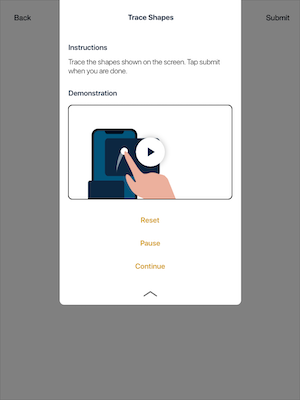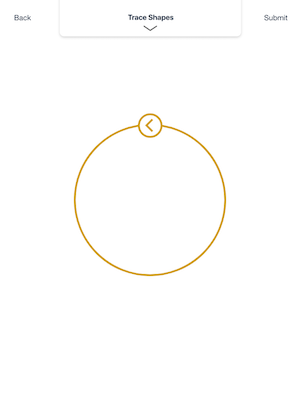Neurological Assessment
Summary
A mobile neurological assessment suite for analyzing cognitive functions through surveys, participatory tasks, and opportunistic data collections.
Details
Recently, a transition of neurocognitive assessments to mobile devices for the benefits of their configurable built-in sensors, scoring, interpretation, and storage capabilities has occurred. As mobile technology becomes increasingly accepted in healthcare among both users and clinicians, the ability to use device information (e.g., device positional data, screen interactions, and application usage) for subject monitoring also increases. With the transition of pen-and-paper style clinical tests to mobile platforms, the current “gold standard” of testing should be updated to include these new beneficial, objective, capabilities. The proposed approach for updating the previous versions of testing, to a comprehensive, systematic implementation of mobile technology, is necessary for understanding conditions of interest. The systematic approach includes the implementation of a mobile device’s sensors, scoring, storage, and usage capabilities as well as the formation of a system based approach using wearable devices and self-reporting techniques, to allow for higher-quality, objective, real-time data collections and analysis. This new standard should be intended to aid clinicians accurately and objectively diagnose neurological conditions, map the development of these conditions over time, and monitor individuals while providing them with efficient, evidence-based, personalized, rehabilitation programs.
Sample Application Design


Dataset
This study is designed to work with a population of individuals with Parkinson's Disease and related dementias. Currently, 54 individuals with Parkinson's Disease are enrolled and corresponding age-matched controls are also included in the dataset.
Publications
- John Michael Templeton, Christian Poellabauer, and Sandra Schneider, "The Case for Symptom-Specific Neurological Digital Biomarkers", Proceedings of the 10th EAI International Conference on Wireless Mobile Communication and Healthcare (MobiHealth), Virtual Conference, November 2021, (accepted, but not yet published; accepted September 28, 2021)
- John Michael Templeton, Christian Poellabauer, and Sandra Schneider, "Design of a Neurocognitive Digital Health System (NDHS) for Neurodegenerative Diseases", Proceedings of the ACM Workshop on Future of Digital Biomarkers (MobiSys '21 Biomarkers Workshop), Virtual Conference, June 2021, doi: 10.1145/3469266.3471157 [link]
- John Michael Templeton, Christian Poellabauer, and Sandra Schneider, "Negative Effects of COVID-19 Stay-at-Home Mandates on Physical Intervention Outcomes: A Preliminary Study", Journal of Parkinson's Disease 2021 doi: 10.3233/JPD-212553 [link]
- John Michael Templeton, Christian Poellabauer, and Sandra Schneider, "Design of a Mobile-Based Neurological Assessment Tool for Aging Populations", Proceedings of the 9th EAI International Conference on Wireless Mobile Communication and Healthcare (MobiHealth), Virtual Conference, November 2020 (Best Paper Award), doi: 10.1007/978-3-030-70569-5_11 [link]
- John Michael Templeton, Christian Poellabauer, and Sandra Schneider, "Enhancement of Neurocognitive Assessments Using Smartphone Capabilities: Systematic Review", JMIR Mhealth Uhealth 2020;8(6):e15517, doi: 10.2196/15517 [link]
Project Members
- Dr. Christian Poellabauer
- John Templeton